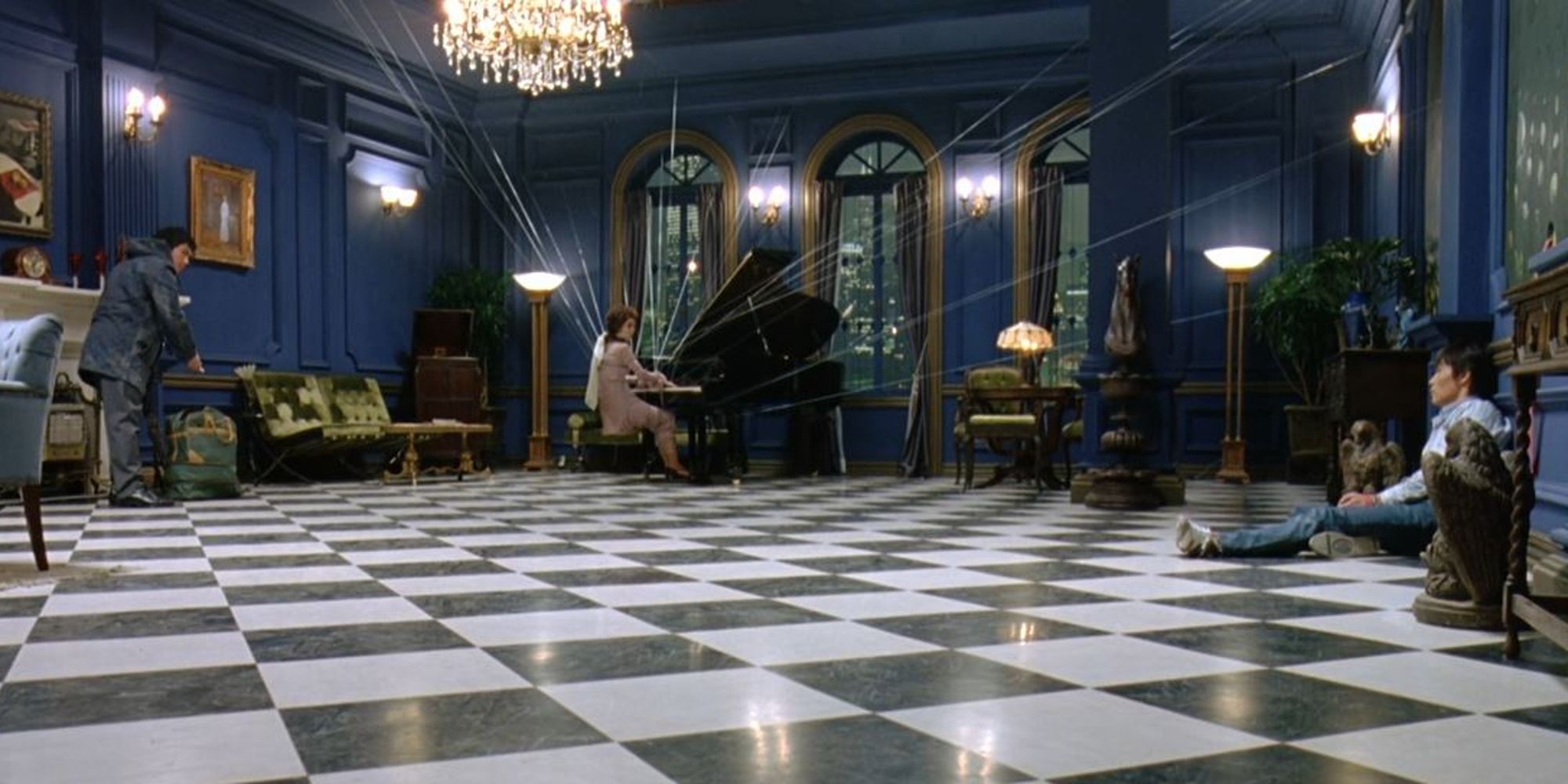Read update
- Park Chan-wook's Decision to Leave still manages to stir up discussions and debates among enthusiastic fans online, allowing a wider audience to discover more of the director's remarkable filmography. Although his films like The Moon is...the Sun's Dream (1992) and 'I'm a Cyborg, But That's OK' (2006) remain unlisted on the site, it's still worth revisiting how his listed movies' rankings have changed since his latest cinematic masterpiece.
Park Chan-wook deftly engages the three senses beyond sight and sound. His attention to detail was honed by a childhood spent watching foreign films without subtitles on the American Forces Korea Network, as alternative entertainment was sparse (according to The New York Times). Having to read faces and interpret gestures gave him a unique way of consuming—and eventually telling—stories.
A lot has been written about the way Park’s movies discuss the futility of revenge, but there’s just as much to unpack regarding their study of synesthetes whose sensitivity to the subtlest stimuli awakens suppressed—and often consequential—desires. His filmography’s themes and motifs have never coalesced more clearly than in his newest project, Decision to Leave, which has rightly earned a high rating on Metacritic.
Updated on January 29th, 2023, by Hannah Saab (Added Three... Extremes):
Park Chan-wook's Decision to Leave still manages to stir up discussions and debates among enthusiastic fans online, allowing a wider audience to discover more of the director's remarkable filmography. Although his films like The Moon is...the Sun's Dream (1992) and 'I'm a Cyborg, But That's OK' (2006) remain unlisted on the site, it's still worth revisiting how his listed movies' rankings have changed since his latest cinematic masterpiece.
9 'Sympathy for Mr. Vengeance' (2002)
Metascore: 56/100
Unable to pay for his sister’s kidney transplant, a deaf steelworker resorts to abducting his employer’s daughter. The second half follows a bereaved father who takes justice into his own hands. This being a Park Chan-wook film, each man’s quest for revenge proves futile.
Sympathy for Mr. Vengeance (the first in the unofficial Vengeance trilogy, which also includes Oldboy and Lady Vengeance) touches upon divisions in Korea exacerbated by global consumer capitalism, a topic the director also addresses in Joint Security Area and The Handmaiden. Visually striking but narratively unwieldy, the film demonstrates Park's growth as an artist but is still far removed from his later achievements.
8 'Joint Security Area' (2000)
Metascore: 58/100
Set on the demilitarized border that separates North and South Korea, Joint Security Area begins after a fatal altercation. A mediator is dispatched from Switzerland to investigate the incident and prevent a hot war from breaking out on the Korean Peninsula. The film is divided between the procedural and flashbacks which show a budding camaraderie between officers on opposite sides of the 38th parallel.
The conflict between obligation and desire may not be as pronounced here as it is in Thirst, Stoker and Decision to Leave, but you can find evidence of it in a scene involving Song Kang-ho and a chocolate moon pie. Additionally, art acts as a bridge between the four men (not to mention the gleam of freshly polished shoes). The movie is much better than its unimpressive Metacritic score suggests.
7 'Stoker' (2013)
Metascore: 58/100
India Stoker’s (Mia Wasikowska) father dies on her 18th birthday. Her emotionally unstable mother (masterfully played by Nicole Kidman) appears to be the only family she has left until the deceased Stoker patriarch’s estranged, enigmatic brother, Charlie (Matthew Goode), arrives for the funeral. Though the two have never met, they share a supernaturally acute perception of their surroundings.
Park’s first English-language project retains the hallmarks for which he’s always been celebrated: Intoxicatingly romantic cinematography (Stoker is shot by Park’s longtime DP, Chung-hoon Chung), sensuous sound design and richly symbolic scene transitions. It’s a shame Stoker’s Metacritic score ranks it closer to Sympathy for Mr. Vengeance than The Handmaiden.
6 'Three... Extremes' (2005)
Metascore: 66/100
Three... Extremes is a spine-chilling horror anthology film that will keep viewers on edge. Three filmmakers directed three short stories in the film. "Dumplings," directed by Fruit Chan, is about an elderly actor who would do anything to seem young, even eating nasty dumplings. The second narrative, "Cut," directed by Park Chan-wook, is about a struggling filmmaker who is abducted by a stranger and forced to create a horrible film. The last tale, "Box," directed by Takashi Miike, follows a writer who is troubled by dreams and starts to doubt reality.
Park Chan-wook's "Cut" is a true standout in the anthology. In it, Jang, a prominent filmmaker, gets kidnapped by Dong-bin. Dong-bin, a failing film director, wants Jang to pay for stealing his movie concept. Dong-bin compels Jang to rehearse sequences from his films, including a female lead. Jang grows desperate to escape as reality and dream blur in a recognizable way for the director's fans. The story criticizes the film industry's ruthlessness and the extent some will go to succeed. The two lead actors provide terrifying and dramatic performances in this segment. Chan-wook's masterful direction will leave viewers questioning the morality of those in the film industry and the cost of success.
5 'Thirst' (2009)
Metascore: 73/100
A Catholic priest participates in a drug trial that incurs unintended side effects, among them an insatiable craving for blood and sex. He begins to question whether he can faithfully carry out his clerical duties in Thirst.
Until Decision to Leave, this tender, twisted, toxic and underrated vampire romance was the clearest articulation of Park Chan-wook’s thematic interests. Both films’ protagonists abandon their formal commitments by succumbing to heightened sensory awareness’ accompanying urges. Thirst isn’t Park’s most critically acclaimed film, but no entry in his oeuvre is likelier to satisfy horror fans.
4 'Lady Vengeance' (2005)
Metascore: 75/100
Geum-ja (Lee Young-ae) is released from prison after serving 13 years for a crime she did not commit. Immediately shedding the saintly persona that got her sentence commuted, she goes on a violent rampage to punish the man responsible for the time she’s lost with her daughter.
Lady Vengeance completes Park’s trilogy and in some ways responds to Quentin Tarantino’s Kill Bill series. While Sympathy for Mr. Vengeance and Oldboy express a clear position on the unintended havoc reaped by taking justice into one’s own hands, Lady Vengeance ends in a cathartic act of revenge that runs counterpoint to Park’s overarching message.
3 'Oldboy' (2003)
Metascore: 77/100
Dae-su (Choi Min-sik) awakens after a night of drunken disorderliness in the room where he’ll spend the next decade. Captivity cures Dae-su’s alcoholism and sharpens his perceptual acuity. After being released one day as inexplicably as he had been abducted, he seeks revenge but discovers his own culpability in the absurd hand fate has dealt him.
You can’t tell from its box office cume, but the ultra-violent and morbidly hilarious Oldboy is Park's most watched and influential film – Spike Lee even directed an English-language remake in 2013. It's a twisty revenge movie for the ages, and one that should be considered essential viewing for fans of the genre.
2 'Decision to Leave' (2022)
Metascore: 84/100
An insomniac detective (Park Hae-il) compromises his marriage and professional integrity after falling in love with a widowed murder suspect (Tang Wei). Writing for Film of the Week, Guy Lodge describes the inconvenient romance as a “sincerely soulful attraction between two people who know nothing—but somehow see everything—of each other.” Sharing with Jonathan Demme and Barry Jenkins a knack for evocative close-ups, Park mines his actors' faces for every detail. Granular mannerisms were, after all, how the director deciphered the films he’d watched as a child.
What encourages someone to drastically change their lives? This decision, the film suggests, is formed not by reason, but the sensorial minutiae—an accidental touch, the faint scent of perfume drifting from a band-aid—that feeds Hae-jun’s obsession with Seo-rae. Park’s camera luxuriates upon the mundane routine of clearing a dinner table like it's a sacred ritual. You’ll have to make a conscious effort to not swoon during Hae-jun and Seo-rae’s first meal together, or their visit under the rain to the Songgwangsa Temple. However you wind up feeling about the way Decision to Leave resolves its central mystery, these are the moments that leave the greatest impression and make Park Chan-wook’s new cinematic confection particularly delectable.
1 'The Handmaiden' (2016)
Metascore: 84/100
Park’s films typically have a lush and sensual atmosphere, but none more so than his foray into erotic cinema, The Handmaiden. Set in Japanese-occupied Korea circa 1930, the movie is about two women at opposite ends of the social ladder—Hideko (Kim Min-hee) is imprisoned in her wealthy, imperialist-sympathizing uncle’s massive estate, while Sook-hee (Kim Tae-ri) is a domestic worker from the countryside—who fall in love and complicate a drifter’s scheme to enrich himself.
Park uses a historical setting to underscore Korea’s present-day political challenges. Hideko is exploited by her uncle in the service of a Japanese art form. Furthermore, Japanese is spoken to signify high social standing, whereas Korean is used in hushed, intimate scenes between the two main characters.


.jpg)
.jpg)
.jpg)

.jpg)
.jpg)
.jpg)
.jpg)
.jpg)